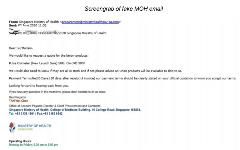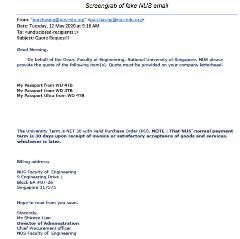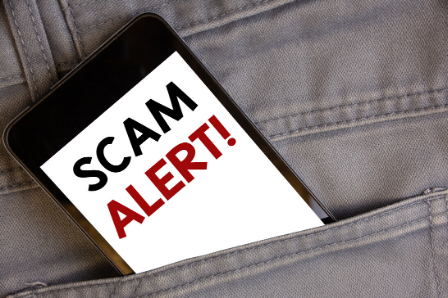|
It has been observed a re-emergence of the purchase order scam whereby scammers would pose as procurement officers from local universities and Government agencies, and induce unsuspecting companies into delivering goods with promises of payments at a later date. Since June 2020, the Police have received at least two reports of such scams, with total losses amounting to at least $160,000.
In such cases, the companies would receive e-mails purportedly sent by a procurement officer from a local university or Government agencies such as the Ministry of Health (MOH), asking for quotations for electronics, IT-related items and medical devices. The scammers would use e-mails bearing the template ‘procurement@___ -sg.com’ or ‘purchasing@___,org’ to convince the companies that they were genuine. The following are some examples of fake e-mails used:
- procurement@sutdedu-sg.com (SUTD)
- procurement@nusedu-sg.com (NUS)
- purchasing@nus-edu.org (NUS)
- procurement@ministryhealthgov-sg.com (MOH)
Once an agreement has been made, a purchase order (PO) would be sent to the company via an email. The company’s staff would believe that they had received a genuine email and PO, and would then deliver the goods to the delivery address indicated in the PO. Preliminary investigations revealed that the delivery address indicated in the POs of such scams usually belonged to freight forwarding companies engaged by the scammers to ship the goods overseas (i.e. to UK, Gambia, and Nigeria). No payments were eventually received.
Examples of Fake Emails


|
Prevention measures
We would like advise companies to adopt the following preventive measures:
- Verify that the sender’s domain name is genuine when receiving e-mails and purchase orders. In such cases, the domain names closely resemble those used by the universities and Government agencies.
- Always verify the authenticity of the request by contacting the universities and Government agencies on their official contact numbers, instead of the numbers provided in the email.
Look out for tell-tale indicators that the e-mail received might be a scam:
- The e-mail might be poorly written with grammatical or spelling errors.
- The delivery address could be that of a private residence, freight forwarding companies or a self-storage facility, rather than that of the university or Government agency.
|
Lastly, educate your employees on how to detect and protect the company from such scams. 5 If you wish to provide any information related to such scams, please call the Police hotline at 1800-255-0000, or submit it online at www.police.gov.sg/iwitness. For urgent Police assistance, please dial ‘999’.
To seek scam-related advice, you may call the anti-scam helpline at 1800- 722-6688 or go to www.scamalert.sg.
|
|
Join the ‘Let’s Fight Scams’ campaign at www.scamalert.sg/fight by signing up as an advocate to receive up-to-date messages and share them with your family and friends.
Together, we can help stop scams and prevent our loved ones from becoming the next victim of scam!
|
|



